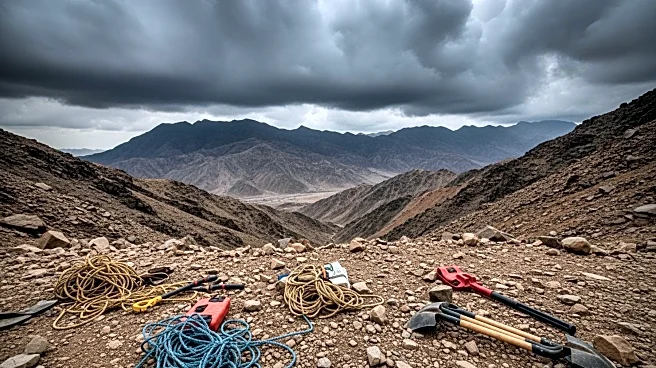What is the story about?
What's Happening?
A catastrophic landslide in Sudan's Marra Mountains has resulted in significant loss of life, with estimates suggesting up to 1,000 fatalities. The disaster, triggered by heavy rainfall, has devastated the village of Tarseen in the Darfur region. Rescue efforts are ongoing, but the challenging terrain and continued rainfall are hampering operations. The Sudan Liberation Movement/Army (SLM/A), which controls the area, has reported the high death toll and is appealing for urgent aid, including medical supplies and food. The UN's deputy humanitarian coordinator for Sudan, Antoine Gérard, noted the difficulty in confirming the exact number of casualties due to the region's inaccessibility.
Why It's Important?
The landslide in Sudan highlights the severe humanitarian challenges faced by the country, exacerbated by ongoing civil conflict. The inability to accurately assess and respond to the disaster underscores the broader issues of infrastructure and resource limitations in conflict zones. The tragedy has drawn international attention, with calls for increased aid and support. The situation poses a significant challenge to humanitarian organizations and local authorities striving to provide relief amidst logistical and environmental obstacles. The event may prompt a reevaluation of disaster preparedness and response strategies in regions affected by conflict.
What's Next?
Efforts to recover bodies and provide aid are expected to continue, with international organizations likely to increase their involvement. The SLM/A's call for assistance may lead to heightened international focus and potential diplomatic engagement to address the humanitarian crisis. The ongoing civil war complicates these efforts, potentially influencing future peace negotiations and international relations. Stakeholders may push for improved infrastructure and communication systems to better handle such disasters in the future.
Beyond the Headlines
The landslide disaster in Sudan raises ethical questions about the responsibility of international communities in providing aid to conflict-affected regions. It also highlights the long-term impact of environmental changes and the need for sustainable development practices to mitigate such risks. The event may influence cultural perceptions of resilience and community support in the face of adversity.















